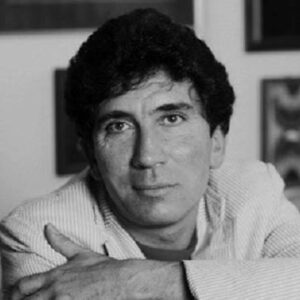Reinaldo Arenas, a Cuban writer, and poet, was imprisoned for several years during Fidel Castro’s rule. Arenas, who was born and raised during the Cuban Revolution, joined Castro’s revolutionary rebel group as a youngster, but later turned against the dictatorship when it began persecuting homosexuals. After openly opposing Fidel Castro’s administration and participating in countless anti-Castro public debates during his exile in the United States, he became one of the most powerful people. He campaigned for the rights of Cuban writers who were marginalized by the Cuban regime, as he was a dedicated and tireless political activist. As his publications grew increasingly critical of the Cuban regime, he was denied permission to publish in Cuba. At the time of his death, nine of his novels, an autobiography, poetry collection, plays, short stories, and several political and literary essays had been published. His well-known writings include ‘Singing from the Well,’ ‘Necesidad de Liberdade,’ ‘Farewell to the Sea,’ ‘Pentagonia,’ and ‘Before Night Falls,’ his autobiography. Scroll down and read this biography to find out more about his personal life, literary achievements, term in jail, and exile.
Youth and Early Life
Reinaldo Arenas was born in the Cuban Oriente town of Holguin. His father abandoned the family shortly after his birth, and his mother brought him to a small farm near Oriente.
His mother taught him to write, and he attended Rural School 91 in Perronales County at the age of six. Aside from school, he attended “literary evening,” a weekend poetry recitation event.
His family struggled to make ends meet, and at the age of 15, he joined Fidel Castro’s revolutionary rebellion against Fulgencio Batista’s regime.
In 1963, he relocated to Havana to attend the “School of Planification” and then studied philosophy and literature at the “Universidad de La Habana.”
Reinaldo Arenas’s Career
After participating in a story-telling contest in 1964, he was invited to work at the “Cuban National Library.” This era influenced his decision to seek a career in literature.
In 1967, he wrote “Singing from the Well,” the first book in his “Patagonia” trilogy. This was the sole installment of the series published in Cuba.
The National Union of Cuban Writers and Artists awarded his novel “The Misfortunate Peregrinations of Fray Servando” second place in 1966. Later, the novel was prohibited in Cuba.
In 1967, the Communist government rejected his writings due to their gay content, and he was interrogated by Cuba’s Directorate of State Security; his writings were then placed under strict surveillance.
Following his departure from the Cuban National Library, he was appointed editor of the Cuban Book Institute, a position he held until 1968.
From 1968 to 1974, he worked as a journalist and editor for the Cuban literary magazine La Gaceta de Cuba.
In 1974, he was arrested and imprisoned on the basis of “ideological deviation” and for disseminating his works overseas without the permission of the Cuban government.
He failed in his effort to escape prison and was arrested and imprisoned at El Morro Castle, a fort that guards the entrance to Havana.
Numerous attempts to smuggle his writings out of prison resulted in harsh punishments and death threats. In 1976, however, he was eventually liberated.
On October 31, 1980, he departed Cuba for the United States as part of the “Mariel Boatlift,” a huge exodus of Cubans.
After relocating to the United States, he resided in New York and resumed writing. He wrote “Old Rosa,” a narrative about a Cuban mother and kid, in 1980.
In 1982, one of his best works, ‘Farewell to the Sea,’ which had been prohibited and confiscated in Cuba, was published in the United States.
In 1986, the collection of writings and lectures titled “Necesidad de Liberdade” was published. The subsequent release was “Graveyard of the Angels.”
In 1988, he wrote “The Doorman,” a novella set in the United States about a Cuban exile.
“Patagonia,” often known as “five agonies,” is a compilation of five books detailing the “hidden history” of post-revolutionary Cuba. The novel series titled ‘Singing from the Well,’ ‘Farewell to the Sea,’ ‘Palace of the White Skunks,’ ‘Color of Summer,’ and ‘The Assault’ is regarded as his magnum achievement, which won him worldwide renown.
The New York Times selected his autobiography “Before Night Falls” on its list of the ten finest books of 1993. In 2000, the same-titled American drama film based on the novel debuted at the Venice International Film Festival and the Toronto International Film Festival.
Awards & Achievements
National Union of Cuban Writers and Artists sponsored the Cirilo Villaverde National Competition, which he won.
His novel ‘Hallucinations’ received the ‘first honorable mention’ in 1966.
Personal History and Legacy
He was diagnosed with AIDS in 1987, yet continued writing despite his illness. In addition, he continued his fight against the Cuban government by speaking out against it.
He committed suicide in Manhattan, New York, on December 7, 1990, unable to endure the melancholy caused by his illness.
His autobiography, Before Night Falls, was released in 1992. This book is a moving tale of his time in Cuba, imprisonment, and escape to the United States.
Estimated Net Worth
Reinaldo is one of the wealthiest and most popular poets. According to our investigation, Wikipedia, Forbes, and Business Insider, Reinaldo Arenas has an estimated net worth of $1.5 million.
Trivia
This homosexual author and rebel from Cuba claimed to have had intercourse with over 5,000 men during his youth.


